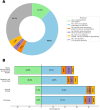Turkish physicians' approach to lesbian, gay, bisexual, transgender, and other gender and sexual minority individuals and their sexual health
- PMID: 40492177
- PMCID: PMC12147215
- DOI: 10.1093/sexmed/qfaf043
Turkish physicians' approach to lesbian, gay, bisexual, transgender, and other gender and sexual minority individuals and their sexual health
Abstract
Background: Lesbian, gay, bisexual, transgender, and other gender and sexual minority (LGBT+) individuals often face healthcare disparities, and physicians' knowledge, attitudes, and clinical preparedness significantly impact access to competent care.
Aim: This study evaluated Turkish physicians' perspectives, knowledge, and clinical approaches to LGBT+ sexual health, highlighting educational and clinical gaps.
Methods: A nationwide cross-sectional survey was conducted among physicians from 10 specialties involved in LGBT+ sexual health. The survey, administered anonymously via Google Forms between June 4, 2024, and February 1, 2025, included sociodemographic questions and items assessing attitudes, clinical experience, and guideline familiarity. Statistical analyses included descriptive statistics, chi-square, Fisher's exact tests, and binary logistic regression to identify predictors of physician attitudes and perceived competence.
Outcomes: The primary outcome was to assess physicians' perspectives, competency, and willingness to provide LGBT+ healthcare, including gender-affirming procedures.
Results: Among 745 participants, 58.8% considered LGBT+ identities normal, while 22.9% classified them as psychiatric disorders. Perceiving LGBT+ identities as normal was significantly associated with being female (OR = 3.12, 95% CI: 1.96-4.96, P < .001), prior experience treating LGBT+ patients (OR = 2.22, 95% CI: 1.60-3.07, P < .001), and physician specialty. This view was most common among psychiatrists (P = .012) and child and adolescent psychiatrists (P = .015). Physicians' views were primarily shaped by education (43.2%) and socio-cultural environment (40.9%). Although 63.9% had treated LGBT+ patients, only 28.2% felt competent, and 11.5% were aware of relevant guidelines. Only 18% of surgical specialists supported gender-affirming procedures. The most commonly cited reason for reluctance was lack of surgical experience (44.8%), along with concerns related to religious beliefs, absence of a surgical team, and potential surgical complications. Ethical dilemmas were evident, as 58.3% believed LGBT+ patients face discrimination in healthcare, and 21.9% supported a physician's right to refuse care based on personal beliefs.
Clinical implications: Enhancing physicians' education and competency in LGBT+ healthcare through structured training and standardized guidelines is crucial to improving equitable healthcare delivery.
Strengths and limitations: This study provides novel insights into physicians' attitudes and practices regarding LGBT+ healthcare in Turkey. However, self-reported data may introduce response bias, and findings may not be fully generalizable to other regions.
Conclusion: Significant educational and clinical gaps persist in LGBT+ healthcare. Addressing these through structured training programs, standardized protocols, and multidisciplinary collaboration is essential to ensuring competent, inclusive, and ethical medical care.
Keywords: LGBT persons; LGBTQqueers; barriers to care; sexual health.
© The Author(s) 2025. Published by Oxford University Press on behalf of The International Society for Sexual Medicine.
Conflict of interest statement
None declared.
Figures





References
-
- World Health Organization . Developing Sexual Health Programmes: A Framework for Action. Geneva, Switzerland: World Health Organization; 2010.
-
- Çeker G, Deliktaş H, Gül Ü, et al. The andrology working Group of the Society of urological surgery in Turkiye: bridging academic gaps and advancing male reproductive and sexual health. J Urol Surg. 2025;12(2):101-107. 10.4274/JUSGALENOS20252025-2-1 - DOI
LinkOut - more resources
Full Text Sources

